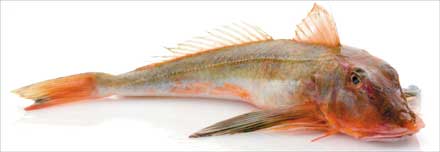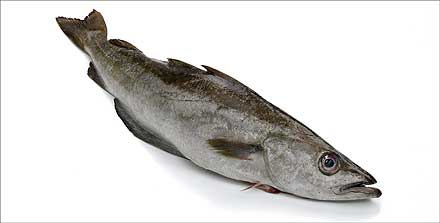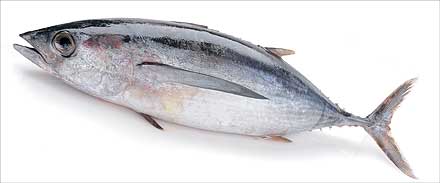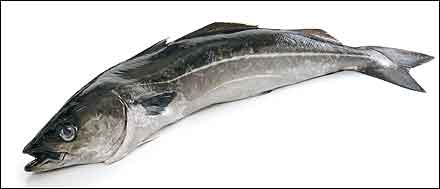Sourcing sustainable fish
As concerns over dwindling fish stocks have magnified, so contract caterers have become increasingly committed to sourcing sustainable fish. Tom Vaughan reports.
As recently as five years ago, contract catering companies talked a good game when it came to sustainable seafood, says Elior's food development director Peter Joyner, but few of them fully embraced the concept: "Without a doubt, five years ago we were paying lip service to the idea, but had little proof to back up what we were doing," he recalls.
As the buzz around the movement has grown in the last half decade, so contract caterers have become more proactive in sourcing sustainable fish. A year ago, Sodexo announced its intention to source only sustainable seafood by 2015, months after rival Compass became the first caterer to gain Marine Stewardship Council (MSC) certification on its menus. It marked a hugely visible step forward for the contract catering sector's commitment to sustainability.
It is a step that has been driven in part by client demands and in part by the caterers themselves. Chris Ling, meat and fish buyer at Compass, says the company has noted an approximate 20% increase in demand for sustainable seafood from clients over the last five years, while Joyner marvels at how commitments to sustainability are these days part of the tenders to clients.
The vastly increased awareness of depleted fish stock levels has been the moral driving force. But how easy has it been for contract caterers to actually commit to sustainability?
The first challenge has been procurement, which has been a joint effort by both caterers and their suppliers. For larger companies such as Compass, the reliability of frozen MSC-certified catches is incredibly helpful, says Ling: "We find that obtaining high volumes of popular species such as Pacific cod, Alaskan pollack, hoki, Pacific salmon and hake is not difficult. The challenge comes in sourcing fresh fish and lesser-known varieties due to their seasonal availability," he explains.
For smaller companies such as BaxterStorey, the ability to juggle suppliers according to what is available is a primary strength when it comes to guaranteeing sustainable fish.
"Our strategy is not to rely too much on one source," says Ian Platt, supply chain general manager at BaxterStorey. "We have 30 or 40 sustainable fish suppliers that we use every day."
At Lexington Catering, its relatively small size is also a plus point, says chef director Rob Kirby: "We haven't got the layers of supply that some of the bigger companies have. If there was a scare on, say, the quality of farmed salmon tomorrow, we could talk directly to our suppliers and make a change overnight."
Fishmongers such as M&J Seafood, Daily Fish Supplies, Matthew Stevens and Son, and Solent Fish all work with their respective clients to ensure the fish they sell is sustainable (see panel). While Ling says that MSC-certified fish tends to cost more than non-MSC, because of restricted supply, other lesser-known but sustainable fish can work out cheaper than their better-known counterparts due to relative unpopularity, says Platt.
However, introducing these lesser-known fish to customers has been a challenge: "There is still a lot of work to do in promoting these fish," says Ling. "Many customers still choose cod, haddock and plaice, but there are many other wonderful sustainable species such as flounder, herring, perch and saithe."
SPREADING THE WORD While Compass has a chef team dedicated to creating new recipes to promote these fish, a more fundamental approach to upselling the fish is education - both of diners and chefs. David Mulcahy is craft and food development director at Sodexo and has been working with his chefs for the last four years to educate them about sustainable seafood.
"You can't wind chefs up by making them do something; they have to want to do it," he explains. "We're in a constant programme of education. Just two weeks ago we took 12 chefs on a trip to learn what MSC certification means, then took them to Penzance to see fishermen who work sustainably so they could see all ends of the chain. It's about understanding what impact we have when we use sustainable fish."
Similarly, at BaxterStorey, the key to selling to customers lies in the skills of the chefs. "Our proposition is driven by highly qualified chefs," says Platt. You need talented teams that can do something nice with it, and serve it with enthusiasm. If you're not upselling it at your restaurant, the customer may well steer away from it." Initiatives at BaxterStorey sites have included bringing in fishmongers for a day to talk to customers and run special offers.
At Elior, literature on the tables communicates a lot of information on sustainable seafood to customers but face-to-face interaction between customers and chefs is still vital to the upsell, says Joyner: "You can very much substitute http://www.alaskaseafood.org.uk" target="_blank" rel="noreferrer">lesser-known sustainable species for premium fish] like for like. It's all about good basic cooking skills; keeping it fresh, keeping it simple, not loading counters with fish that is drying under lights. A lot of what we do now is about the theatre of cooking, letting customers interact with the chef and even watch their food cook."
I asked everyone I interviewed what was their favourite variety of sustainable fish, and one product cropped up over and over again - farmed salmon. "On its day it can be a superb fish," says Kirby. "It's versatile, its price is OK and it's sustainable. Plus it gives you the options of so many recipes, you can even do hot smoked salmon or gravadlax."
The last five years have seen the contract catering industry come on in leaps and bounds, but no one in the sector is resting on their laurels, says Kirby: "It's a long process, but slowly customers are becoming more and more educated. Public perception of what fish should and shouldn't be eaten is on the increase. It is our job to continue driving that forward."
FURTHER INFORMATION
[www.alaskaseafood.org.uk
www.msc.org
www.seafish.orgwww.seafoodscotland.org
RECOMMENDED SUSTAINABLE FISH FROM M&J SEAFOOD
Arctic char - Farmed in Ireland. Available fresh all year.
Cod (Atlantic) - Farmed organically in Scotland and Norway. Available fresh all year.
Cod (Pacific) - Eastern Bering Sea and Aleutian Islands, MSC-certified. Fillets and loins available frozen all year.
Coley - Norwegian, North Sea and North-East Arctic fisheries all MSC-certified. Fresh April to December.
Cuttlefish - From south coast. Best in autumn and winter.
Dab - Plentiful. Best from June to February.
Dover sole - Hastings Fleet fishery, MSC-certified. Limited availability all year.
Grey mullet - Mostly line-caught by day boats. Best from July to September.
Gurnard - Fresh from August to March, frozen fillets all year.
Hake - MSC-certified South African hake. Frozen all year.
Halibut - Farmed in Scotland and northern Europe. Available all year.
Herring -Thames, Hastings and various North Sea fisheries are MSC-certified. Available from spring to autumn.
Hoki - MSC-certified from New Zealand. Available frozen all year.
Mackerel - South-west and Hastings fisheries are MSC-certified. Available all year but best quality and availability is July to October.
Pollack (British) - Available all year but avoid January to April when spawning.
Pollack (Alaskan) - MSC-certified. Available frozen all year.
Salmon (Alaskan) - MSC-certified. Available frozen all year.
Salmon (Shetland) - Farmed, RSPCA Freedom Food-approved. Available fresh all year.
Sardines - Ring-net caught in Cornwall. Currently in MSC pre-assessment.
Sea bass (line-caught) - Caught at MSC-certified Holderness Coast fishery.
Sea bass (farmed) - Available all year.
Sprats - From Cornwall and the South-west. Available from August to March.
Squid (British) - Available all year, but at its best from August to March.
Tuna (Albacore) - Line-caught in Cornish Albacore fishery, in MSC pre-assessment. Available fresh July to September, frozen all year.
Turbot - Farmed in Scotland, Norway and Spain. Available all year.
Whiting - Plentiful. Available May to February.
For a full list, visit www.mjseafood.com














